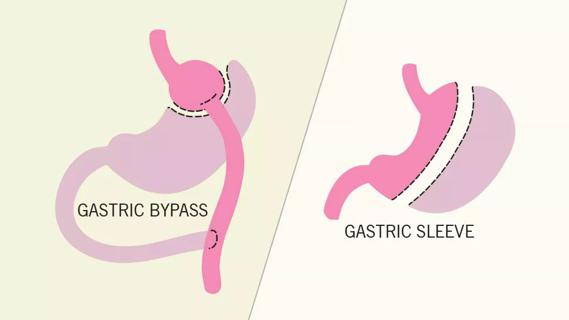Advertisement
A safe and effective surgery that shouldn’t be considered only as a last resort

Having obesity is more than a number on a scale or a measurement of your body mass index (BMI). It’s a complex metabolic disease.
Advertisement
Cleveland Clinic is a non-profit academic medical center. Advertising on our site helps support our mission. We do not endorse non-Cleveland Clinic products or services. Policy
When you’re living with obesity, your metabolism slows. That means, even with big changes in your diet or exercise habits, your body may not react. And your weight may not reflect the efforts you’re making.
Bariatric surgery, or what some people may call weight loss surgery, can counteract that metabolic change if you have obesity.
“Bariatric surgery is an important and effective treatment for people living with obesity to manage their health,” says bariatric surgeon Ali Aminian, MD. “We know that the body responds to weight loss surgery in many ways that help people with obesity to manage their conditions and live full lives.”
Bariatric surgery is a safe, evidence-based treatment that does more for your body than shed pounds. Dr. Aminian says it’s the #1 most effective route to treating obesity and obesity-related illnesses. Better than any diet or exercise program.
We talked with Dr. Aminian about what you need to know about bariatric surgery so you can decide if you might be a candidate.
The Centers for Disease Control and Prevention (CDC) estimates that more than 42% of people in the U.S. have obesity. But only about 1% of people who are eligible actually get bariatric surgery.
Advertisement
Bariatric surgery has been shown to:
In the past, bariatric surgery was a more invasive procedure. Following surgery, people would stay in the hospital for up to a week. Recovery would take several months.
These days, most bariatric surgeries are done laparoscopically. That’s to say, they’re minimally invasive surgeries that use a thin, telescopic rod with a camera at the end to see inside your body. That means quicker recoveries and fewer complications.
“We do surgery through five or six small holes,” Dr. Aminian explains. “People go home the same day or the next day, and they recover after two or three days. Today’s procedures are much safer and produce better effects to help people lose weight and lower their risk for obesity-related illnesses.”
Two popular laparoscopic procedures — Roux-en-Y Gastric Bypass and sleeve gastrectomy — now account for about 90% of all weight-loss surgeries performed worldwide.
Here, Dr. Aminian answers some common questions people have about bariatric surgery.
A: There are two leading authorities on bariatric surgery: The American Society for Metabolic and Bariatric Surgery (ASMBS)and the International Federation for the Surgery of Obesity and Metabolic Disorders (IFSO). The two organizations published their latest guidelines in 2022. They recommend bariatric surgery be considered for:
This is an expansion of previous guidelines published in the early 1990s. Those guidelines suggested bariatric surgery be reserved for people with more severe forms of obesity.
Dr. Aminian hopes the expanded guidelines will help more people access bariatric surgery and its benefits.
“The field of metabolic and bariatric surgery has progressed considerably,” Dr. Aminian adds. “I hope these guidelines can open the doors for some people who did not have access to bariatric and metabolic surgery by the old, outdated guidelines.”
Advertisement
A: Research shows bariatric surgery is as safe or safer than many other routine surgeries, like gallbladder removals, appendix removals and knee replacements. It’s been around decades now, since the 1970s, and the latest techniques have proven to have few complications.
Especially when you consider the long-term risks of living with obesity, any risk of bariatric surgery is very minimal.
A: Bariatric surgery has helped millions of people treat obesity and related conditions.
“Bariatric surgery is currently the most effective tool we have to improve the lives and the health of people living with obesity,” Dr. Aminian states. “After bariatric surgery, people typically lose 20% to 40% of their body weight and sustain it over decades. On average, bariatric surgery can provide six years of additional life for people with obesity.”
A: You may have heard bariatric surgery mentioned as a sort of backup method to other obesity treatments, like diet and exercise. But Dr. Aminian encourages a change in that thinking.
“For people with heart disease, we don’t wait to treat them until they experience a heart attack. For people with cancer, it is always better to start treatment in the earliest stage. A similar concept is true when we consider weight-loss surgery to treat obesity,” Dr. Aminian stresses. “Surgery shouldn’t be viewed as the last resort or only for patients with extremely high BMIs.”
Advertisement
In other words, it’s safer and more effective to intervene when obesity is in its earlier stages, rather than waiting until you experience severe complications.
You’ll notice that the guidelines for people who are candidates for bariatric surgery use BMI as a benchmark for determining eligibility. BMI is a measurement of your height-to-weight ratio.
The truth is that BMI is not an entirely accurate measurement of your health, though. That’s because muscle weighs more than fat. So, people who are more muscular tend to have a higher BMI, but that doesn‘t mean they’re less healthy.
“BMI has its limitations,” Dr. Aminian notes. “In the future, it’s likely that we will have a better understanding of the disease process, which will allow us to take a more individualized approach to treatment. But for now, treating people based on certain BMI thresholds is the most practical way to address obesity.”
Your healthcare provider will consider your BMI as one indication of your health, but it shouldn’t be the only factor considered. Your provider will be able to help you understand if your BMI is a true reflection of a health concern or not.
More than 650 million adults around the world were living with obesity in 2016, according to the World Health Organization. In the United States, the prevalence of obesity increased from about 31% to 42% between 2000 and 2017. It’s estimated that by 2030, 50% of people in the U.S. will be living with obesity. Estimates show that 1 in 4 of them will have class III obesity.
Advertisement
“The biggest issue is that we overly emphasize lifestyle modifications,” Dr. Aminian says. “Obesity is a chronic progressive disease. It requires more aggressive treatment.”
If you’re living with obesity, talk with a healthcare provider about whether you might be a candidate for bariatric surgery. They can help you understand your options.
Learn more about our editorial process.
Advertisement

Gastric bypass and sleeve gastrectomy are different procedures that offer similar benefits, including significant weight loss

What you should know about bariatric surgery

Some people can safely lose weight on just 1,200 calories — but it’s not right for everyone

Don’t diet while pregnant, but do eat lots of healthy foods

There’s little evidence that probiotics cause weight loss, but having a healthy gut microbiome may set the stage for it

Cardio activities such as running, swimming and cycling offer immediate returns

After a cholecystectomy, your body may temporarily have a hard time processing fat and fiber

Non-exercise activity thermogenesis is all the activity we do that’s not technically exercise but is still important to your health and well-being

If you’re feeling short of breath, sleep can be tough — propping yourself up or sleeping on your side may help

If you fear the unknown or find yourself needing reassurance often, you may identify with this attachment style

If you’re looking to boost your gut health, it’s better to get fiber from whole foods